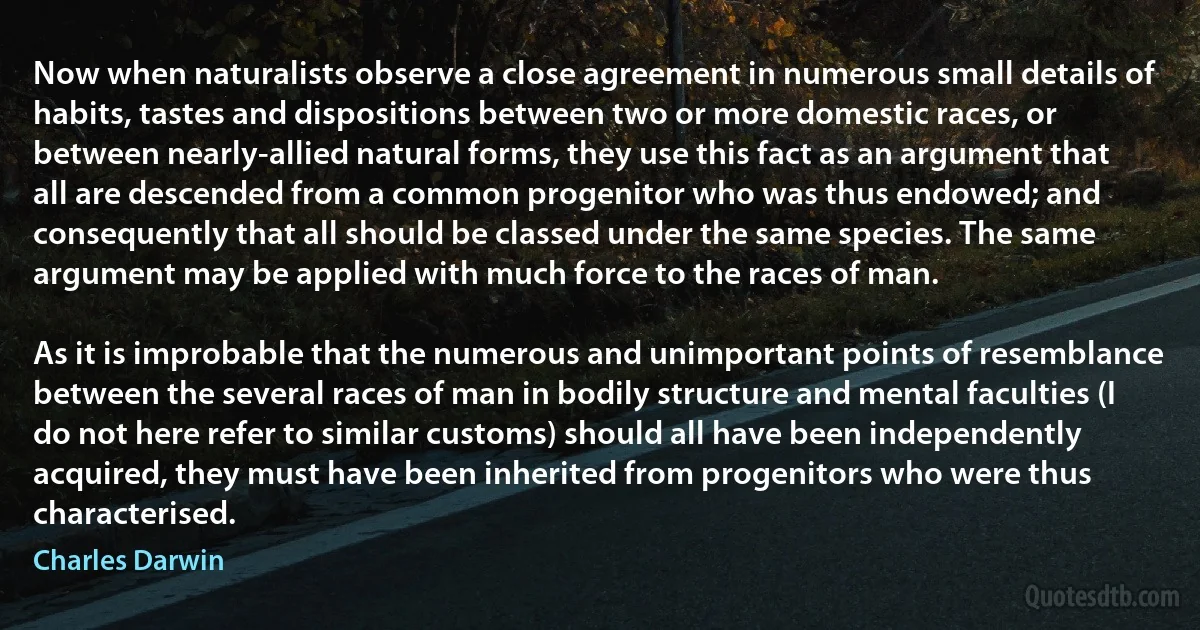
Now when naturalists observe a close agreement in numerous small details of habits, tastes and dispositions between two or more domestic races, or between nearly-allied natural forms, they use this fact as an argument that all are descended from a common progenitor who was thus endowed; and consequently that all should be classed under the same species. The same argument may be applied with much force to the races of man. As it is improbable that the numerous and unimportant points of resemblance between the several races of man in bodily structure and mental faculties (I do not here refer to similar customs) should all have been independently acquired, they must have been inherited from progenitors who were thus characterised.
Charles DarwinRelated topics
agreement argument close common force man natural now observe progenitor should small thus under use customs pointsRelated quotes
Neither force, nor argument, nor opinion," said Merlyn with the deepest sincerity, "are thinking. Argument is only a display of mental force, a sort of fencing with points in order to gain a victory, not for truth. Opinions are the blind alleys of lazy or of stupid men, who are unable to think. If ever a true politician really thinks a subject out dispassionately, even Homo stultus will be compelled to accept his findings in the end. Opinion can never stand beside truth. At present, however, Homo impoliticus is content either to argue with opinions or to fight with his fists, instead of waiting for the truth in his head. It will take a million years, before the mass of men can be called political animals.

T. H. White
Three points make me hardy to ask it. The first is, because it is so low a thing: for if it were an high thing I should be a-dread. The second is, that it is so common: for if it were special and privy, also I should be a-dread. The third is, that it needeth me to know it (as methinketh) if I shall live here for knowing of good and evil, whereby I may, by reason and grace, the more dispart them asunder, and love goodness and hate evil, as Holy Church teacheth. I cried inwardly, with all my might seeking unto God for help, saying thus: Ah! Lord Jesus, King of bliss, how shall I be eased? Who shall teach me and tell me that me needeth to know, if I may not at this time see it in Thee?

Julian of Norwich
Had there not been a natural goodness and indestructible force in my father, I see not how be could have bodied himself forth from these mean impediments. I suppose good precepts were not wanting. There was the Bible to read. Old John Orr, the schoolmaster, used from time to time to lodge with them; be was religious and enthusiastic (though in practice irregular with drink). In my grandfather, also, there seems to have been a certain geniality; for instance, he and a neighbor, Thomas Hogg, read "Anson's Voyages;" also tho "Arabian Nights," for which latter my father, armed with zealous conviction, scrupled not to censure them openly. By one means and another, at an early age he had acquired principles, lights that not only flickered, but shone steadily to guide his way.

Thomas Carlyle
Our adversaries are not demons, witches, fate, or mental illness. We have no enemy whom we can fight, exorcise, or dispel by "cure." What we do have are problems in living - whether these be biologic, economic, political, or sociopsychological. In this essay I was concerned only with problems belonging in the last mentioned category, and within this group mainly with those pertaining to moral values. The field to which modern psychiatry addresses itself is vast, and I made no effort to encompass it all. My argument was limited to the proposition that mental illness is a myth, whose function it is to disguise and thus render more palatable the bitter pill of moral conflicts in human relations.

Thomas Szasz
I have now reached a stage in the argument where I have to choose between being too definite or being too vague. If I set forth a concrete proposal in all its particulars, I expose myself to a hundred criticisms on points not essential to the principle of the plan. If I go further in the use of figures for illustration, I am involved more and more in guess-work; and I run the risk of getting the reader bogged in details which may be inaccurate and could certainly be amended without injury to the main fabric. Yet if I restrict myself to generalities, I do not give the reader enough to bite on; and am in fact shirking the issue, since the size, the order of magnitude, of the factors involved is not an irrelevant detail.

John Maynard Keynes
